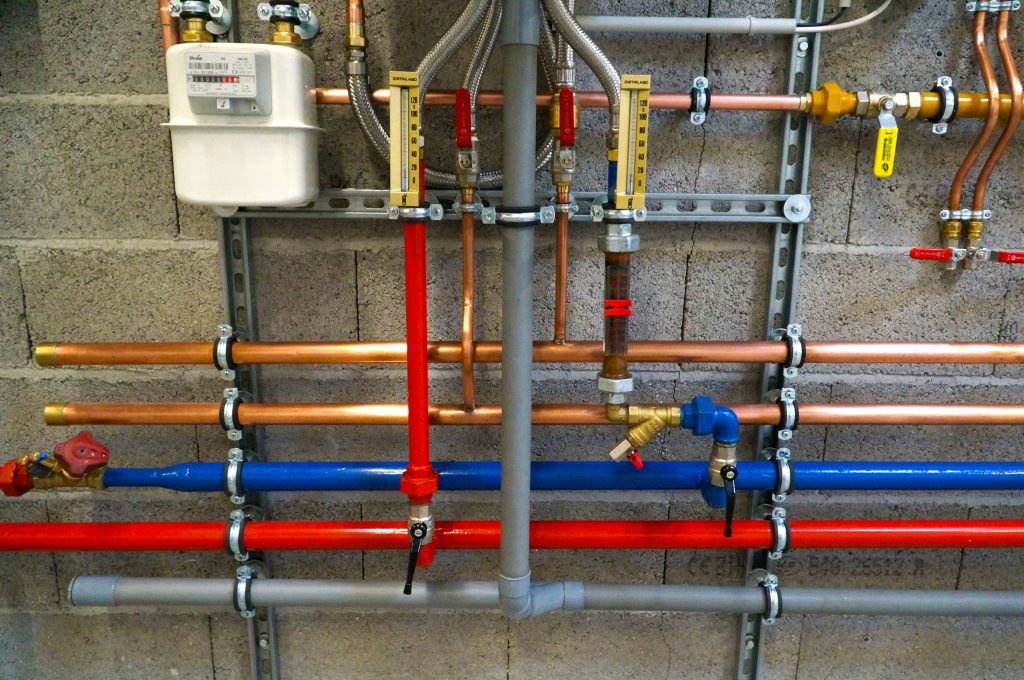Niepokojące odgłosy dochodzące z instalacji grzewczej mogą mieć różne przyczyny. Aby im zapobiec warto zrobić przegląd instalacji przed okresem grzewczym. Jeśli jednak mimo to pojawi się hałas w rurach centralnego ogrzewania, w wielu przypadkach możemy poradzić sobie z nim samodzielnie – bez pomocy fachowców. Oto kilka najpopularniejszych przyczyn powstawania hałasu w rurach c.o. oraz sprawdzone sposoby ich rozwiązania.
Zapowietrzenie systemu grzewczego – przyczyny i skutki
Najczęstszym powodem hałasu w rurach centralnego ogrzewania jest powietrze, które dostaje się do instalacji i zakłóca jej pracę. Aby instalacja działała prawidłowo powinna być wypełniona wodą, nie powietrzem.
[su_box title=”Przyczyny zapowietrzania się instalacji:” style=”glass” box_color=”#7ea5b1″]
Powietrze dostaje się do rur c.o. podczas napełniania czynnikiem grzewczym (wodą, wodą demineralizowaną, glikolem).
Użyto nieodpowiednich materiałów, np. rur z polipropylenu bez wkładki dyfuzyjnej, która zapobiega dostaniu się powietrza do wnętrza.
W łączeniu z układem otwartym dochodzi do kontaktu wody z powietrzem atmosferycznym przez naczynie wzbiorcze.
Niewielkie nieszczelności, powstające przed pompą, po stronie ssawnej. [/su_box]
Efektem zapowietrzonej instalacji są szumy i gwizdy słyszalne przez domowników. A także niegrzejące wcale lub do połowy zimne grzejniki oraz głośna praca pompy obiegowej. Przy instalacjach z rur stalowych może dojść do korozji, a w późniejszym czasie do rozszczelnienia instalacji.
Hałas w rurach c.o. – jak odpowietrzyć instalację centralnego ogrzewania?
Jeśli nasza instalacja jest wyposażona w automatyczne odpowietrzniki należy sprawdzić ich działanie. Może się zdarzyć bowiem tak, że odpowietrzniki są uszkodzone i nie działają prawidłowo, a co za tym idzie w instalacji zbiera się duża ilość powietrza. Aby sprawdzić czy zawór automatyczny działa prawidłowo, należy zdjąć z niego zaślepkę i nacisnąć na iglice przy pomocy cienkiego drutu. W przypadku prawidłowego działania, powinna wypłynąć z niego woda. Podobnie działają zawory ręczne. Po odkręceniu niezapowietrzonej instalacji wypłynie woda, w zapowietrzonej pojawi się syczące powietrze.
Hałas w rurach – przekroczenie dopuszczalnej prędkości przepływu cieczy w instalacji
Kolejną przyczyną powstawania uciążliwych hałasów w instalacji centralnego ogrzewania może być zbyt duża prędkość pompowanej cieczy. Bardzo ważne jest odpowiednie obliczenie wartości przepływów wody przed założeniem instalacji. Przekroczenie tych norm skutkuje bowiem destabilizacją ciśnienia w instalacji, a co za tym idzie powstaniem słyszalnego szumu. Ponadto podwyższone ciśnienie wody pojawia się w instalacji, kiedy wyłączymy lub ograniczymy działanie niektórych grzejników. W takiej sytuacji woda przepływa przez pozostałe zawory pod znacznie większym ciśnieniem niż dotychczas. Rozwiązaniem tego problemu jest zmniejszenie wydajności pompy.

Zanieczyszczenia lub zakamienienie elementów instalacji ogrzewania centralnego
Przyczyna nadmiernego hałasu w instalacji mogą być również zanieczyszczenia i kamień osadzające się na poszczególnych elementach instalacji. Wymiennik ciepła może ulec zarówno zabrudzeniu jak i zakamienieniu. Dzieje się tak najczęściej w domach z twarda wodą. Znaczenie mają także pH wody oraz jej temperatura, która ułatwia proces wytrącania się osadów. Należy wtedy sięgnąć po specjalne chemiczne środki, które umożliwia oczyszczenie instalacji. Aby zapobiec zanieczyszczaniu się elementów instalacji, należy używać do jej napełniania wody uzdatnianej. Ta płynąca z wodociągów zawiera osady wapnia, żelaza oraz innych pierwiastków, które znacznie skracają żywotność instalacji. Inne czynniki powodujące zanieczyszczenie instalacji to kurz i brud wytwarzane podczas remontu, a także tłuszcz z past uszczelniających, stosowanych do łączenia rur.
Skutkiem zakamienionej lub zanieczyszczonej instalacji jest wydłużenie czasu potrzebnego do nagrzania znajdującej się w niej wody. Zanieczyszczenia stanowią pewnego rodzaju warstwę izolacyjna, utrudniającą otrzymanie odpowiedniego poziomy temperatury. Przez to proces ogrzewania wymaga poboru większej mocy, a co za tym idzie jest drożdży i mniej ekologiczny.
Jak widać nie ma jednej przyczyny powstawania hałasu w instalacji centralnego ogrzewania. Oprócz tych wyżej omówionych, istnieje szereg usterek i błędów popełnionych podczas zakładania ogrzewania, z którymi nie jesteśmy w stanie poradzić sobie sami. Jeśli odpowietrzenie grzejników, uregulowanie ciśnienia w instalacji oraz jej oczyszczenie specjalnymi środkami nie przyniesie poprawy, należy skontaktować się z serwisantem.
